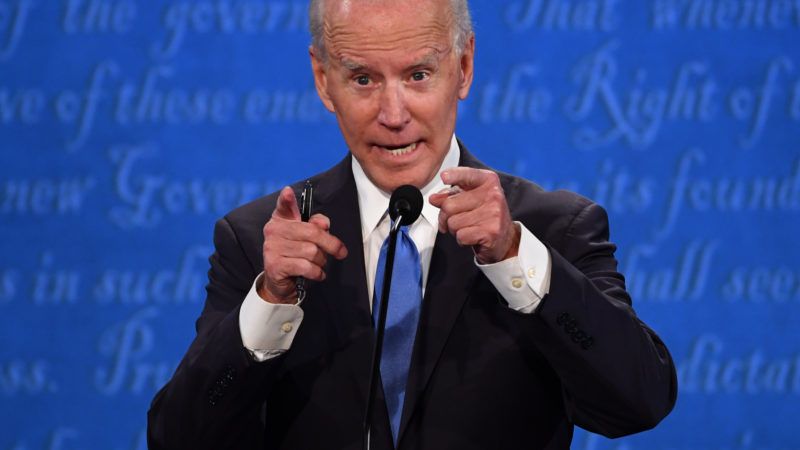Joe Biden's Proposal To Double the Minimum Wage to $15 an Hour Won't Help Small Businesses
President Donald Trump said he'd leave it to the states to decide if a minimum wage hike was appropriate.

Former Vice President and Democratic nominee Joe Biden wants to help small businesses during the pandemic by raising their labor costs with a minimum wage hike.
"I do," said Biden in response to a question at tonight's debate about whether now is the time to raise the federal minimum wage to $15 an hour, before going on an extended riff about the need for a federal small business bailout. The current federal minimum wage is $7.25 an hour.
"We have to help our small businesses by raising the minimum wage? That's not helping" shot back an incredulous Trump. "How are you helping small businesses when you're forcing wages [up]? What's going to happen and what's been proven to happen is when you do that these small businesses fire many of their employees."
"There is no evidence that when you raise the minimum wage businesses to go out of business," rebutted Biden, saying that a minimum wage hike was needed to increase the pay of first responders.
Trump, in response to a prompt from debate moderator Kristen Welker, said he would consider raising the federal minimum wage to $15 an hour, but also said it should be left up to the states, saying "Alabama is different from New York. New York is different from Vermont. It should be a state option." Make of that what you will.
Back in July 2019, the Congressional Budget Office released a report finding that a $15 federal hourly minimum wage would result in 1.3 million workers losing their jobs, while raising pay for another 17 million workers.
While the effects of the minimum wage on unemployment are not without controversy, most studies find they lead to higher unemployment or disemployment (where firms hire fewer workers over time, give current workers fewer hours, or outsource more tasks to machines or customers.)
A detailed study commissioned by the Seattle city government to examine its own $15 minimum wage found that worker pay rose about 3 percent but hours worked fell by 6 to 7 percent. These disemployment effects were hardest on the lowest paid, least experienced workers. That means the proposed wage increase won't only hurt businesses, it'll likely hurt workers too.
A lot of the debate and empirical evidence about the effects of raising the minimum wage is predicated on more normal economic circumstances where a global pandemic isn't scaring away customers, of course, and local and state governments aren't forcibly closing businesses or requiring them to operate at reduced capacity.
In the current environment, wage hikes would likely be devastating for the countless mom-and-pop operations on the verge of failure. In fact, many of those small businesses are already maxed out as they struggle to keep employees on the payroll in order to qualify for loan forgiveness under another federal program.
Why Biden thinks that small businesses already coping with massive declines in revenue and increased operating costs would benefit from having their labor get more expensive is a bit of a mystery. While Trump was right to point out the negative consequences that can come from raising the minimum wage, he undermined his own case by equivocating on whether doing so was a good idea.
Biden, during his minimum wage answer, said that Congress should allocate more money to struggling businesses. If he has his way on the minimum wage, they'll need all the assistance they can get.
Bonus: Check out Reason's video on the effects of a $15 hourly minimum wage on New York car wash workers:
Rent Free is a weekly newsletter from Christian Britschgi on urbanism and the fight for less regulation, more housing, more property rights, and more freedom in America's cities.


Show Comments (114)